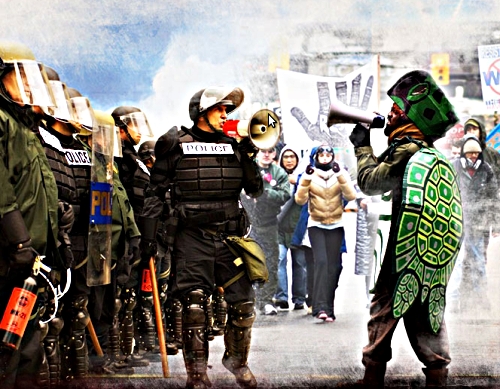South Africa
Hamba kahle Comrade Dennis Brutus (1924-2009)

There will come a time
There will come a time we believe
When the shape of the planet
and the divisions of the land
Will be less important;
We will be caught in a glow of friendship
a red star of hope
will illuminate our lives
A star of hope
A star of joy
A star of freedom
-- Dennis Brutus, Caracas, October 18, 2008
By Patrick Bond
December 26, 2009 -- World-renowned political organiser and one of Africa’s most celebrated poets, Dennis Vincent Brutus, died early on December 26, 2009, in Cape Town, in his sleep, aged 85.
Even in his last days, Brutus was fully engaged, advocating social protest against those responsible for climate change, and promoting reparations to black South Africans from corporations that benefited from apartheid. He was a leading plaintiff in the Alien Tort Claims Act case against major firms that is now making progress in the US court system.
How to cure the post-Copenhagen hangover

By Patrick Bond, Durban
December 23, 2009 -- In Copenhagen, the world’s richest leaders continued their fiery fossil fuel party last Friday night, December 18, ignoring requests of global village neighbours to please chill out. Instead of halting the hedonism, US President Barack Obama and the Euro elites cracked open the mansion door to add a few nouveau riche guests: South Africa’s Jacob Zuma, China’s Jiabao Wen (reportedly the most obnoxious of the lot), Brazil’s Lula Inacio da Silva and India’s Manmohan Singh. By Saturday morning, still drunk with their power over the planet, these wild and crazy party animals had stumbled back onto their jets and headed home.
The rest of us now have a killer hangover, because on behalf mainly of white capitalists (who are having the most fun of all), the world’s rulers stuck the poor and future generations with the vast clean-up charges – and worse: certain death for millions.
A lesson from Seattle for Copenhagen: Vigorous activism can defeat the denialists

By Patrick Bond
South Africa: Time for a new democratic left party?

By Mazibuko K. Jara
October 30, 2009 -- Our country is in crisis. There is deepening inequality, many people live in permanent poverty and millions are unemployed for most of their adult lives. Women continue to suffer from social oppression, violence and poverty. The very ecological and biophysical conditions for our human existence are under threat.
Retrogressive ideologies in our society are gaining ground: we are going back to ethnic identity, we have retrogressive notions of womanhood, we have seen the rise in the power of undemocratic rule of unelected chiefs. The state is dysfunctional, corrupt and fraudulent. The state seems unwilling to confront the economic system that produces all these crises. Together, none of these socioeconomic problems can be addressed by a South Africa that reproduces capitalism. These problems require solutions that go beyond capitalist accumulation.
Is it correct to regard the Jacob Zuma-led African National Congress (ANC) as left? Whilst the Zuma-led ANC is much friendlier to the left than Thabo Mbeki's, neoliberal capitalism survives in South Africa.
South Africa: ‘The African Communist': 50 years of mobilisation, analysis

The African Communist, 1991.
By Blade Nzimande
October 26, 2009 -- A browse through the very first edition of the African Communist in 1959 not only gives an insight into the time and context during which it was launched but also the courageous and defiant character of those who breathed life into our historic journal.
This magazine, the African Communist, has been started by a group of Marxist-Leninists in Africa, to defend and spread the inspiring and liberating ideas of Communism in our great Continent, and to apply the brilliant scientific method of Marxism to the solution of its problems.
It is being produced in conditions of great difficulty and danger. Nevertheless we mean to go on publishing it, because we know that Africa needs Communist thought, as dry and thirsty soil needs rain.
When the climate change centre cannot hold
By Patrick Bond
By Nigel Gibson and Raj Patel
October 8, 2009 -- Pambazuka News -- You don’t need presidential palaces, or generals riding in tanks, or even the CIA to make a coup happen. Democracy can be overthrown with far less pomp, fewer props and smaller bursts of state violence. But these quieter coups are no less deadly for democracy.
At the end of September 2009, just such a coup took place in South Africa. It wasn’t the kind involving parliament or the inept and corrupt head of the African National Congress (ANC) Jacob Zuma. Quite the opposite. It involved a genuinely democratic and respected social movement, the freely elected governing committee of the shack settlement at Kennedy Road in Durban. And this peaceful democracy was overthrown by the South African government.
The persecution of Caster Semenya -- sport and intersex people's rights

Caster Semenya.
By Farida Iqbal

